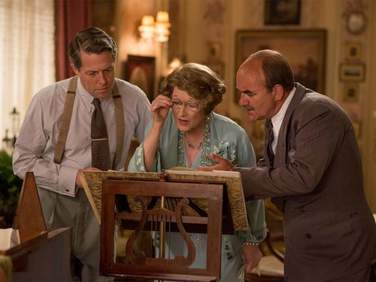 A scene from Flora Foster Jenkins.
A scene from Flora Foster Jenkins. Much like a car accident that people can’t look away from, there’s something irresistibly fascinating about the human failing of self-delusion.
Miguel de Cervantes knew he was on to something, back in 1605, when he invented Don Quixote, the self-styled knight whose vivid imagination completely usurped reality. More recently, the 1994 biopic Ed Wood focused on the famously inept filmmaker.
The film follows on the heels of several stage plays about Foster Jenkins in the last two decades, a documentary film and, most recently, a published biography. There was a time when she was a kind of a private “in-joke” in the classical music world. But now her posthumous reputation is expanding in all directions.
In Frears’ film, Foster Jenkins is played by Meryl Streep – and much to her credit, Streep fleshes out her role, emphasizing her character’s frailty and courage as well as her supreme obliviousness. Also, Streep sings very badly very well. Indeed, her vocal portrayal of Foster Jenkins – full of off-pitch hooting and screeching – could be taken for an outrageously exaggerated caricature.
Except it’s no caricature – it’s the truth. As listening to the real Foster Jenkins quickly reveals, she was every bit as dreadful as Streep makes her out to be. Through her recordings, she has lived on to astound successive generations of singers and listeners.
“The first time I heard her, I was in university,” recalls Canadian opera star and CBC broadcaster Ben Heppner. “I can remember the joy of listening to her recordings. They were so bad they were good.”
As for what exactly made Foster Jenkins such a terrible singer, Heppner can only speculate. “Maybe she gargled with Absorbine Jr.,” he suggests with a laugh. “I don’t know if her voice was damaged in some way, or if she just didn’t have an ear for music.”
Heppner also points that there was another crucial element sorely lacking in Foster Jenkins’ musical development: honesty. “Singers need outside ears,” he explains. “And that’s why professional opera singers have to keep on studying, throughout their careers. You need somebody to guide you, and you pay for the unvarnished truth, not to be placated.”
Like anyone who sets themselves up (consciously or sub-consciously) as a Naked Emperor, Foster Jenkins couldn’t have done it without the support of others. Fortunately for her, she had a canny ability to surround herself with the right kind of people. As a wealthy heiress and a prominent socialite – the president of her own Verdi Club – she was politely indulged (and also feared) within her circle of friends. And her well paid coaches and accompanists knew what to say, and what not to say, to keep their pay-cheques coming.
But Foster Jenkins’ biggest supporter was her second husband, a none-too-successful English actor named St. Clair Bayfield. In Florence Foster Jenkins he’s portrayed by Hugh Grant, with a touch so light that his character threatens to float away. The only thing that seems to anchor Grant’s Bayfield to the floor is his firm belief that he’s doing the right thing. “Without loyalty there’s nothing,” he solemnly declares to pianist Cosmé McMoon (played by Simon Helberg, best known as Howard Wolowitz on television show The Big Bang Theory). Armed with this conviction, Bayfield happily bribes music critics and carefully cherry-picks attendees for Foster Jenkins’ private recitals.
The ultimate fulfillment of Foster Jenkins’ musical aspirations – and also the culmination of the movie – was her 1944 public recital at Carnegie Hall. By this point, she had become well known through her recordings and radio broadcasts, and the event sold out. Among the attendees were such notables as the songwriter Cole Porter, the actress Tallulah Bankhead and the famous soprano Lily Pons.
Soon, bursts of convulsive laughter broke out in the audience – yet according to eyewitness accounts, Foster Jenkins wasn’t fazed by this reaction. Afterwards, Bayfield wrote in his diary that the recital went very well.
Were people laughing with her, or at her? In Florence Foster Jenkins, Frears has the audience do both things at once, suggesting that she was admired for her indomitable spirit, and appreciated as the source of so much hilarity – whether it was intended or not.
The moral of the story is that a failure and a triumph can be one in the same thing. As the worst opera singer ever, Foster Jenkins was brilliantly triumphant.
© Colin Eatock 2016
 RSS Feed
RSS Feed

